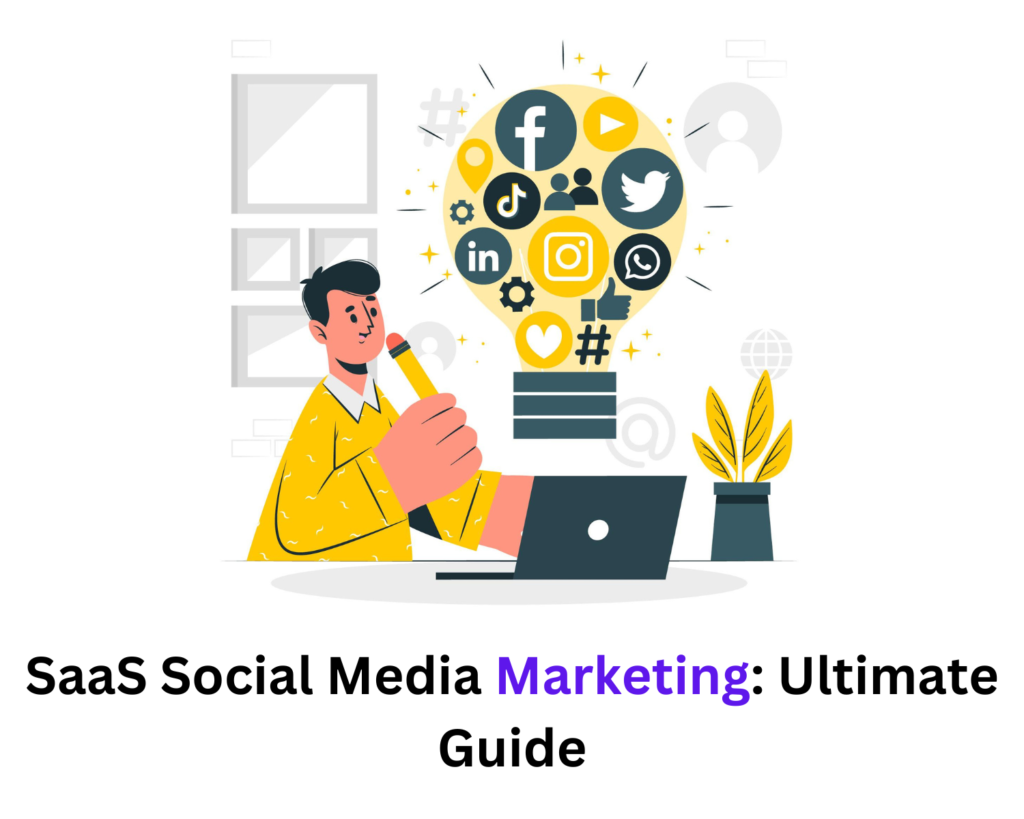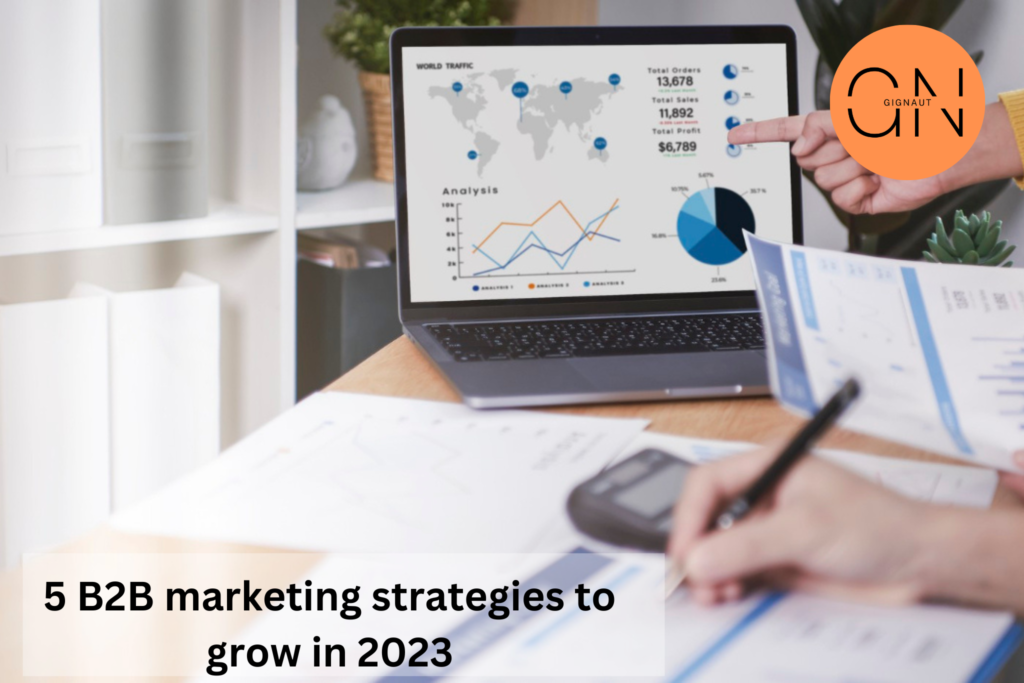In today’s digitalized world, the integration of technology has made social media an indispensable aspect of marketing strategies for B2B SaaS companies. However, with a plethora of platforms available in today’s market space, making a decision can be quite daunting for marketers who seek to effectively employ these tools.
This article aims to provide critical factors that should be taken into consideration when determining the most suitable platform, as well as insights into popular options that align well with the marketing strategies of B2B SaaS companies.
Understanding your target audience is of utmost importance before immersing yourself in the realm of social media. It is crucial to identify your ideal customer profile (ICP) and buyer persona as a fundamental step. Conducting research to track their social media habits and preferences can enable you to gain insights into their online presence and the platforms they frequently engage with.
Facebook For SaaS Social Media Marketing
Let’s dive deeper into Facebook, an immensely popular social media platform, and explore the myriad ways it can benefit B2B SaaS companies. With its vast user base comprising billions of active users from diverse backgrounds and age groups, Facebook presents a melting pot of potential clientele.
Facebook Business Pages provide a platform to establish a professional online presence and showcase your brand. By leveraging targeted advertising options, you can effectively reach specific audiences based on their demographics, interests, and behaviors, thereby amplifying the impact of your marketing endeavors.
Furthermore, Facebook Groups offer a distinctive opportunity to connect with niche communities, industry experts, and potential clients. Active engagement in relevant groups and the sharing of valuable insights can position you as a thought leader, fostering trust and credibility.
Now, let’s turn our attention to remarkable B2B SaaS companies that have effectively harnessed the power of Facebook. HubSpot, a renowned marketing automation platform, shares educational content, and industry insights, and actively engages with their audience. By consistently delivering value and establishing themselves as a go-to resource for marketing professionals, they have cultivated a devoted community.
Similarly, Slack, a widely embraced team collaboration tool, showcases their product’s features, highlights success stories from satisfied customers, and provides updates on new integrations. Through targeted audience engagement and fostering engagement, Slack has grown a substantial following on Facebook.
These examples illustrate how B2B SaaS companies can utilize Facebook’s features to connect with their target audience, establish themselves as thought leaders, and enhance brand awareness. With a well-planned strategy and consistent efforts, Facebook can be an invaluable platform for your B2B SaaS company’s social media presence.
Linked For SaaS Marketing
Now, let’s delve into another promising social media platform for B2B SaaS companies: LinkedIn. Renowned as the go-to platform for professionals, LinkedIn offers unique opportunities to engage with a business-oriented audience.
LinkedIn boasts an extensive community of professionals, making it an ideal platform for B2B interactions. Its user base encompasses individuals from diverse industries, including decision-makers, industry experts, and potential clients. Whether you’re targeting CEOs, HR professionals, or IT managers, LinkedIn grants access to a highly engaged and relevant audience.
LinkedIn offers several key features and benefits for B2B SaaS companies.
Firstly, company pages on LinkedIn allow you to establish a professional presence for your brand. These pages serve as a hub where you can share updates, product information, and thought leadership content, creating a strong online presence for your company.
LinkedIn also provides robust networking capabilities. You can connect with industry peers, join relevant groups, and participate in discussions to establish valuable connections and expand your professional network. This networking potential can lead to partnerships, collaborations, and business opportunities.
Targeted advertising options on LinkedIn are particularly advantageous for B2B SaaS companies. You can reach specific job titles, industries, or even companies with your advertising campaigns, ensuring that your message reaches the right audience. This targeted approach can help you generate high-quality leads and increase brand visibility among key decision-makers in the industry.
Additionally, LinkedIn offers a platform for content marketing, allowing you to share informative and engaging content with your target audience. By regularly publishing valuable content, you can position your company as a thought leader in the B2B SaaS space and build trust and credibility with potential customers.
Furthermore, LinkedIn provides analytics and insights to track the performance of your company page, content, and advertising campaigns. These metrics can help you measure the effectiveness of your marketing efforts and make data-driven decisions to optimize your strategies.
Overall, LinkedIn is a valuable tool for B2B SaaS companies to establish their brand presence, connect with industry professionals, target their advertising, and showcase their expertise through content marketing.
LinkedIn’s features have been effectively utilized by successful B2B SaaS organizations.
Salesforce, a well-known CRM platform, engages its audience through thought leadership content, stories of triumph, and noteworthy industry updates. They have built a loyal following and positioned themselves as a trusted authority in the realm of CRM.
Adobe, a leading software corporation, leverages LinkedIn to disseminate captivating visual content such as infographics and videos, showcasing the capabilities of their products. They actively interact with their audience by participating in industry dialogues and offering expert guidance. This approach has enabled Adobe to cultivate strong brand loyalty and establish meaningful connections with professionals in their target market.
These instances emphasize the prowess of LinkedIn for B2B SaaS enterprises. By utilizing its networking features, publishing platform, and targeted advertising options, you can establish connections with a relevant audience, position yourself as a thought leader in the industry, and enhance brand recognition. LinkedIn serves as a valuable platform to forge substantial professional relationships and generate leads for your B2B SaaS company.
Twitter For SaaS Social Media Marketing
Let’s dive into the realm of Twitter, a dynamic social media platform renowned for its real-time updates and succinct messages. Despite its character limit, Twitter presents unique advantages for B2B SaaS enterprises. Here’s what you should keep in mind:
Twitter boasts a diverse user base encompassing various demographics. It attracts professionals, influencers, journalists, and individuals who crave up-to-the-minute information and engaging discussions. The platform’s active user base and extensive reach make it an appealing choice for B2B interactions.
The concise format and fast-paced nature of Twitter align well with the needs of B2B SaaS companies. Consider the following key features and benefits:
1. Networking and Thought Leadership: Twitter provides an avenue to connect with industry influencers, experts, and potential clients. By actively participating in conversations, sharing valuable insights, and joining relevant hashtags, you can establish yourself as a thought leader in your respective field. This positions your B2B SaaS company as an authoritative voice, bolstering brand visibility and credibility.
2. Real-time Updates and News Sharing: Twitter’s dynamic nature enables you to share immediate updates regarding your company, product launches, industry news, and events. It serves as an effective channel to stay connected with your audience and keep them well-informed about the latest happenings. Quick announcements and time-sensitive promotions can elicit immediate engagement and responses.
3. Customer Building Support and Relationship: Twitter provides a platform to address customer inquiries, concerns, and feedback promptly. By delivering timely and helpful responses, you can showcase your commitment to customer satisfaction and forge strong relationships with both existing and potential customers.
Numerous B2B SaaS enterprises have harnessed the unique features of Twitter to their advantage. For instance, Buffer, a social media management platform, effectively utilizes Twitter to share insightful industry knowledge, engage their audience through polls and thought-provoking questions, and provide valuable tips on social media marketing. Through consistent delivery of valuable content and active participation in conversations, Buffer has garnered a dedicated following and established itself as an industry leader.
Similarly, Mailchimp, an email marketing platform, leverages Twitter’s capabilities to share success stories, industry trends, and relevant articles. They also proactively respond to customer queries and provide support, thereby showcasing their dedication to customer satisfaction and building trust.
These examples illustrate how B2B SaaS companies can harness Twitter’s unique strengths to foster engagement, demonstrate expertise, and cultivate meaningful connections. By leveraging its real-time updates, networking opportunities, and customer support capabilities, you can effectively reach and connect with your target audience on this dynamic platform.
Factors to Consider When Choosing Social Platforms
When it comes to selecting the most suitable social media platforms for your B2B SaaS company, several factors should guide your decision-making process. Let’s explore the key considerations:
A. Defining your business goals and objectives is the first step in selecting social media platforms. Determine whether you aim to increase brand awareness, generate leads, drive website traffic, or foster customer engagement. Each platform offers different opportunities that align with specific objectives, so understanding your goals will help prioritize the platforms that best support your desired outcomes.
B. Consider your target audience’s preferences and behavior when choosing social media platforms. Research where your audience spends their time online, which platforms they engage with most frequently, and how they prefer to consume content. This information will guide you in selecting platforms that align with your audience’s habits, ensuring your content reaches them effectively.
C. Different social media platforms are optimized for specific content types and formats. For example, Instagram thrives on visually appealing images, while LinkedIn emphasizes professional and educational content. Consider the type of content you plan to create, such as blog articles, videos, infographics, or interactive posts, and choose platforms that support and showcase your content in its best format.
D. Evaluate your available resources, including time and budget, when deciding on social media platforms. Building and maintaining an active presence on each platform requires an investment of time and effort. Some platforms also offer paid advertising options that may require budget allocation. Assess your resources realistically and choose platforms that you can consistently and effectively manage within your limitations.
E. Conducting a comprehensive analysis of your competitor’s social media presence is crucial. Identify the platforms they utilize and examine their strategies and engagement levels. While it’s important not to directly copy your competitors, understanding their approach can provide valuable insights into which platforms are effective within your industry. Set yourself apart by identifying any gaps or opportunities that your competitors may have overlooked.
By considering these factors—business goals, target audience preferences, content type, resource allocation, and competition analysis—you can make informed decisions about the social media platforms that align with your B2B SaaS company’s objectives. This strategic selection will maximize your chances of success, as it’s not just about being present on every platform, but rather choosing the ones that offer the greatest potential for achieving your goals.
Wrapping Up
The process of selecting the right social media platforms for your B2B SaaS company is critical and can significantly impact your marketing success. By understanding your target audience, aligning with your business goals, and considering the unique strengths of each platform, you can make informed choices that optimize your reach, engagement, and overall success. Embrace the dynamic nature of social media, stay informed about platform updates, and continuously refine your strategies to build a strong online presence and drive growth for your B2B SaaS company.
Get in touch with the Gignaut team today to start measuring and improving your marketing efforts.
Check the B2B SaaS Marketing Handbook to learn more.
Uzma is a Professional Content Writer and Certified Digital Marketing Expert




